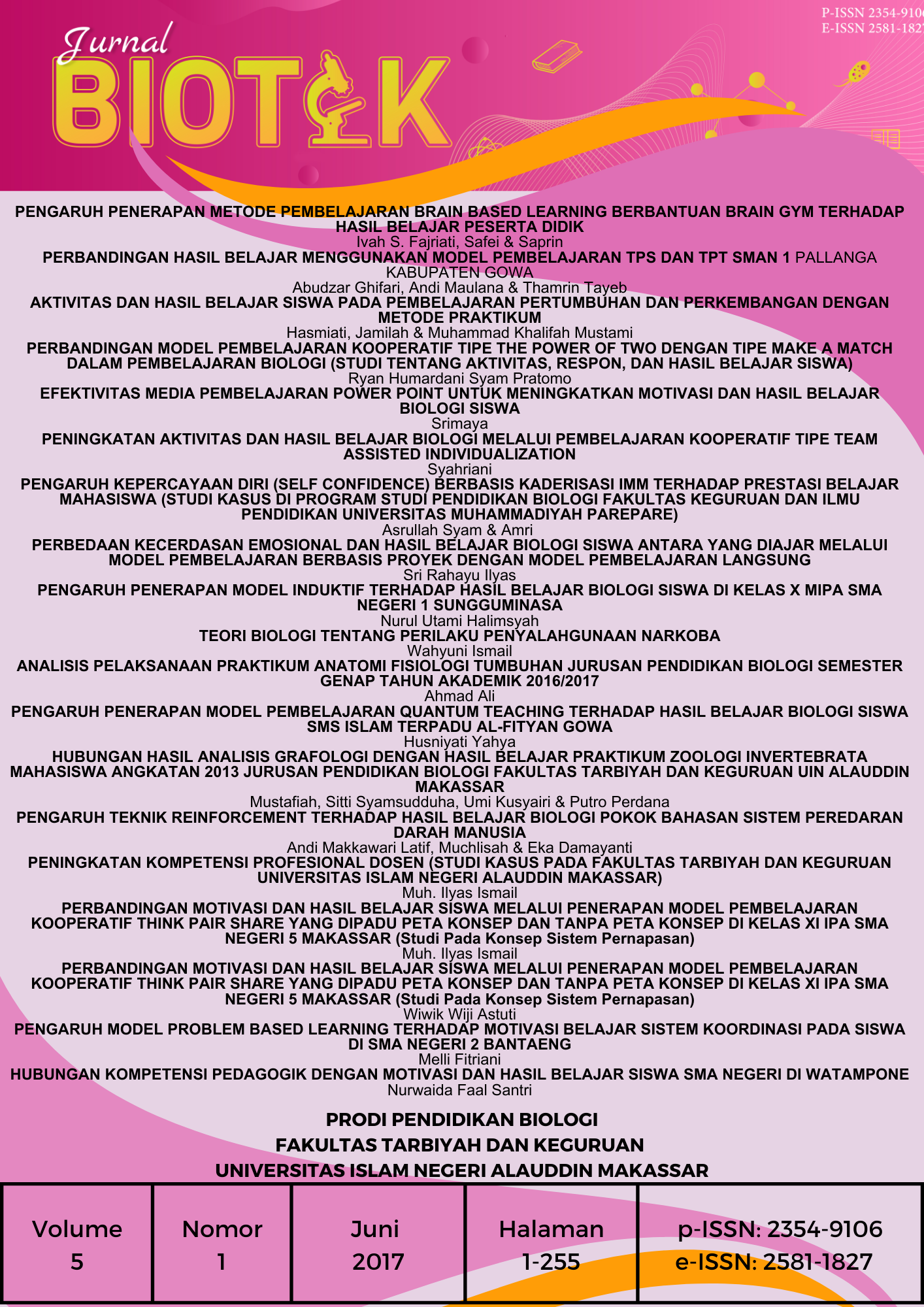PENINGKATAN AKTIVITAS DAN HASIL BELAJAR BIOLOGI MELALUI PEMBELAJARAN KOOPERATIF TIPE TEAM ASSISTED INDIVIDUALIZATION
Abstract
The cooperative learning of Team Assisted Individualization (TAI) type is a form of learning of a combination between cooperative learning and individual learning. Students stay in groups but each of them study based on his or her speed and ability. This study aims at examining (1) the improvement of activity in learning Biology of grade XI IPA Students at Madrasah Aliyah Madani Alauddin Pao-Pao through the application of cooperative learning of TAI type, and (2) the improvement learning outcomes on Biology of grade XI IPA students at Madrasah Aliyah Madani Alauddin Pao-Pao through the application of cooperative learning of TAI type. This study is a classroom action research. The subject of the study was 20 grade XI IPA students at Madrasah Aliyah Madani Alauddin Pao-Pao. Data were collected by employing questionnaire of observation sheet on activity of students, and the test of learning outcomes. Data were analyzed quantitatively in percentage. The results reveal (1) the cooperative learning of TAI type can improve the activity of students of grade XI IPA at Madrasah Aliyah Madani Alauddin Pao-Pao with the mean score 44.90 in cycle I and improved to 75.00 in cycle II, and (2) the cooperative learning of TAI type can improve Biology learning outcomes of grade XI IPA students at Madrasah Aliyah Madani Alauddin Pao-Pao with the percentage of completeness 65 % in cycle I and improved to 90% in cycle II. The conclusion of this study is the cooperative learning if TAI type can improve motivation, activity, and learning outcomes of Biology of grade XI IPA students at Madrasah Aliyah Madani Alauddin Pao-Pao in Gowa.
Downloads
References
Angriani, D. (2011). Keefektifan Model Kooperatif Tipe TAI dengan Pendekatan Realistik dalam Pembelajaran Sistem Persamaan Linear Dua Variabel di Kelas VIII SMP Negeri 4 Sinjai Utara. Makassar: Tesis PPS UNM.
Fitriani. (2007). Meningkatkan Hasil Belajar Kimia Siswa Kelas X3 SMA Negeri 3 Makassar Melalui Model Pembelajaran Konstruktivistik (Studi Pokok Bahasan Ikatan Kimia). Makassar: Skripsi FMIPA UNM.
Haling, A. (2006). Belajar dan pembelajaran. Makassar: Badan Penerbit UNM.
Hasibuan, M. (2006). Proses Belajar Mengajar. Bandung: Remaja Rosdakarya.
Ibrahim, M, dkk. (2005). Pembelajaran Kooperatif. Surabaya: Unesa University Press.
Khaeruddin dan Sujiono, Eko. (2005). Pembelajaran Sains (IPA)Berdasarkan kurikulum Berbasis Kompetensi. Makassar: Badan Penerbit UNM Makassar.
Kusmaningrum, R. (2007). Keefektifan Model Pembelajaran Kooperatif Tipe TAI Melalui Pemamfaatan LKS terhadap Hasil Belajar Matematika Sub Pokok Bahasan Jajar genjang dan Belah ketupat pada Siswa Kelas VII SMPN 11 Semarang.(Online).(http://digilib.unnes.ac.id/gsdl/collect/skripsi/archives/HASHI2e3/7ad3118f6.dir.doc.pdf). Diakses tanggal 10 November 2011
Nilawati, A. (2008). Peningkatan Hasil Belajar Matematika Melalui Pembelajaran Kooperatif Tipe Team Assisted Individualization (TAI) pada Murid Kelas V SD Inpres Lipukasi Kecamatan Tanete Rilau Kab. Barru. Makassar: Skripsi FMIPA UNM.
Riyanto, Y. (2009). Paradigma Baru Pembelajaran (Sebagai Referensi bagi Pendidik dalam Implementasi Pembelajaran yang Efektif dan Berkualitas. Jakarta: Kencana Prenada Media Group.
Sagala, S. (2010). Konsep dan makna pembelajaran (Untuk Membantu Memecahkan Problematika Belajar dan Mengajar). Bandung: Alfabeta.
Sanjaya, W. (2005). Pembelajaran dalam Implementasi Kurikulum Berbasis Kompetensi. Jakarta: Kencana Prenada Media Group.
__________(2007). Strategi Pembelajaran. Jakarta: Kencana.
Sardiman, A. M. (2010). Interaksi dan Motivasi Belajar-Mengajar. Jakarta: Rajawali Press.
_________ (2011). Interaksi dan Motivasi Belajar Mengajar. Jakarta: Raja Grafindo Persada
Sudjana, N. (2006). Penilaian Hasil Belajar Mengajar. Bandung: Remaja Rosdakarya.
Sopah, J. (2000). Pengaruh Model Pembelajaran dan Motivasi Berprestasi Terhadap Hasil Belajar. Jurnal Pendidikan dan Kebudayaan, jilid 1, No. 22. (http://www. Motivasi.ac.id. Diakses 5 Maret 2010).
Slavin, R. (2008). Cooperative Learning Teori, Riset dan Praktik. Bandung: Nusamedia.
Slameto. (2003). Belajar dan Faktor-Faktor yang Mempengaruhinya. Jakarta: Rineka Cipta.
Yusuf. (2007). Pembelajaran Kooperatif. Jurnal Ilmu Pendidikan (online) (http//:www. damandiri.or.id/file/ yusufunsbab2.pdf. Diakses tanggal 15 Mei 2012).
Authors who publish with Jurnal Biotek agree to the following terms: Authors retain the copyright and grant Universitas Islam Negeri Alauddin Makassar right of first publication with the work simultaneously licensed under a Creative Commons Attribution License (CC BY-SA 4.0) that allows others to share (copy and redistribute the material in any medium or format) and adapt (remix, transform, and build upon the material) the work for any purpose, even commercially with an acknowledgement of the work's authorship and initial publication in Universitas Islam Negeri Alauddin Makassar. Authors are able to enter into separate, additional contractual arrangements for the non-exclusive distribution of the journal's published version of the work (e.g., post it to an institutional repository or publish it in a book), with an acknowledgement of its initial publication in Universitas Islam Negeri Alauddin Makassar. Authors are permitted and encouraged to post their work online (e.g., in institutional repositories or on their website) prior to and during the submission process, as it can lead to productive exchanges, as well as earlier and greater citation of published work (See The Effect of Open Access).

This work is licensed under a Creative Commons Attribution-ShareAlike 4.0 International License.



